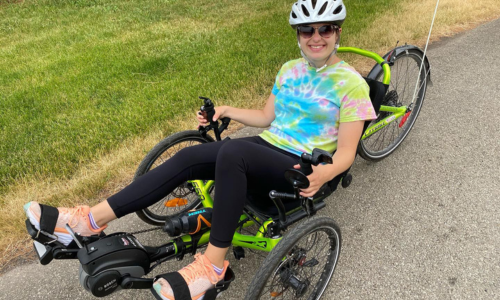
Guest Author: Ellie Martin
According to the World Health Organization, rehabilitation is defined as “a set of interventions designed to optimize functioning and reduce disability in individuals with health conditions in interaction with their environment.” Rehabilitation can help by making everyday activities more enjoyable.
Using rehabilitation services is a way to improve quality of life, both physically and mentally, for people affected by Ataxia. There are many benefits to taking part in some form of rehabilitation:
- Increased physical and mental strength
- Improved confidence, independence, and self-awareness
- Educating others about Ataxia
- Setting and achieving goals
My name is Ellie and I have a rare form of Cerebellar Ataxia. I recently graduated from college where I studied rehabilitation services. I am going to share information I learned along with some personal experiences on the subject. I am creating a series of 12 articles that focus on rehabilitation services that can be beneficial to others with Ataxia. Here are a few ways that using rehabilitation therapy for movement disorders has made a big difference in my life with a rare form of Ataxia.

Increased Physical and Mental Strength
Improved Confidence, Independence, and Self-Awareness
Educating Others
Rehabilitation is a perfect opportunity to educate and spread awareness about Ataxia. With Ataxia being a rare disease, it is common to come across people who are not familiar with Ataxia. I have participated in many different types of rehabilitation therapies, and it hasn’t always been easy to find a specialist who is trained in working with Ataxia patients. NAF’s Ataxia and specialty clinic list is a great resource when looking for specialists where you live. I have referred some of my therapists and personal trainers to look at the information provided by NAF to become more familiar with Ataxia symptoms, exercises, and treatments. Helping others to learn more about Ataxia also helps us.
Creating Goals

Disclaimer: Always seek the advice of your physician or other qualified health care provider with any questions you may have regarding a medical condition or treatment and before undertaking a new health care regimen, exercise, treatment, or nutritional supplement.
Humber River Health, Shelley Aronov-Jacoby. “The Benefits of Self-Awareness.” Humber River Health, 27 Jan. 2022, www.hrh.ca/2022/01/27/the-benefits-of-self-awareness/.
“Rehabilitation.” World Health Organization, World Health Organization, www.who.int/news-room/fact-sheets/. Accessed 4 Mar. 2024.
Elaine Houston, B.Sc. “What Is Goal Setting and How to Do It Well.” PositivePsychology.Com, 21 Feb. 2024, positivepsychology.com/goal-setting/.
















